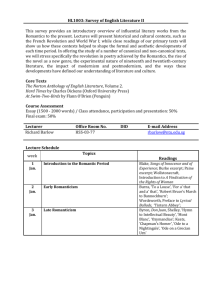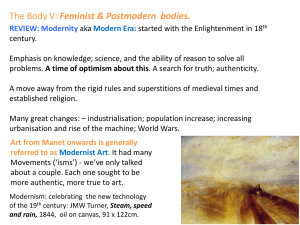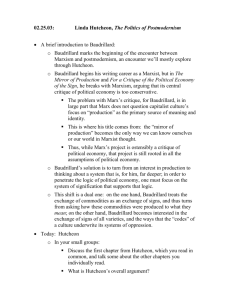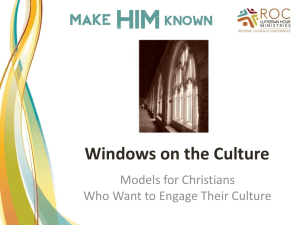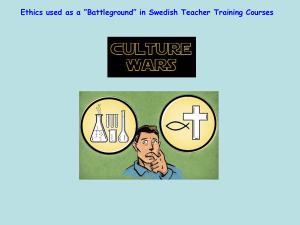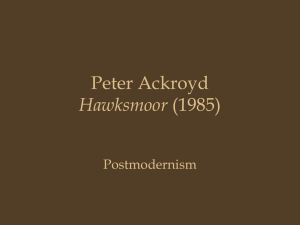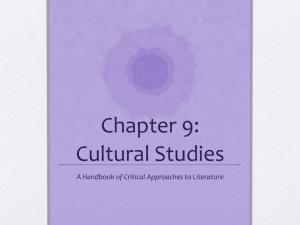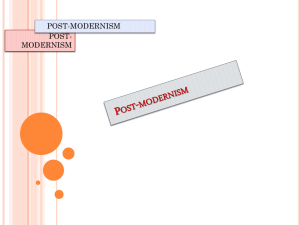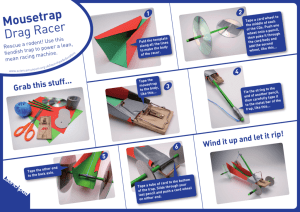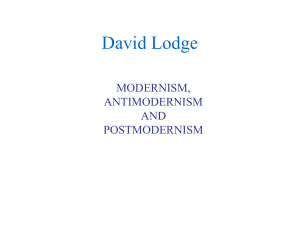ART HISTORY 3701 - 001
advertisement
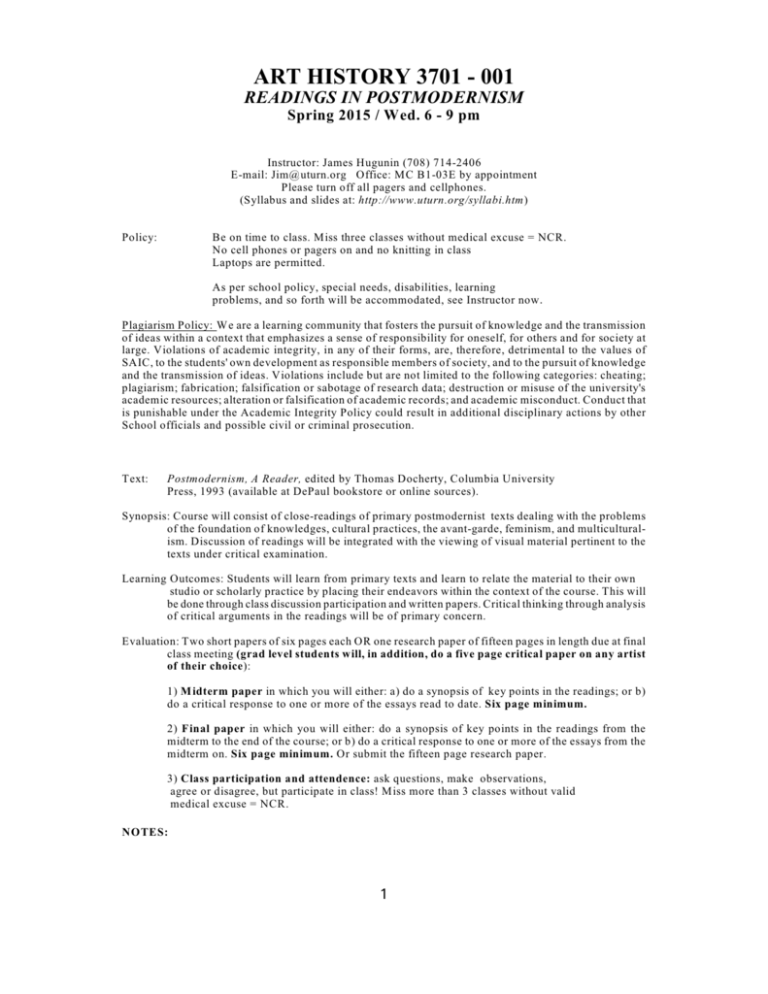
ART HISTORY 3701 - 001 READINGS IN POSTMODERNISM Spring 2015 / Wed. 6 - 9 pm Instructor: James Hugunin (708) 714-2406 E-mail: Jim@uturn.org Office: MC B1-03E by appointment Please turn off all pagers and cellphones. (Syllabus and slides at: http://www.uturn.org/syllabi.htm) Policy: Be on time to class. Miss three classes without medical excuse = NCR. No cell phones or pagers on and no knitting in class Laptops are permitted. As per school policy, special needs, disabilities, learning problems, and so forth will be accommodated, see Instructor now. Plagiarism Policy: W e are a learning community that fosters the pursuit of knowledge and the transmission of ideas within a context that emphasizes a sense of responsibility for oneself, for others and for society at large. Violations of academic integrity, in any of their forms, are, therefore, detrimental to the values of SAIC, to the students' own development as responsible members of society, and to the pursuit of knowledge and the transmission of ideas. Violations include but are not limited to the following categories: cheating; plagiarism; fabrication; falsification or sabotage of research data; destruction or misuse of the university's academic resources; alteration or falsification of academic records; and academic misconduct. Conduct that is punishable under the Academic Integrity Policy could result in additional disciplinary actions by other School officials and possible civil or criminal prosecution. Text: Postmodernism, A Reader, edited by Thomas Docherty, Columbia University Press, 1993 (available at DePaul bookstore or online sources). Synopsis: Course will consist of close-readings of primary postmodernist texts dealing with the problems of the foundation of knowledges, cultural practices, the avant-garde, feminism, and multiculturalism. Discussion of readings will be integrated with the viewing of visual material pertinent to the texts under critical examination. Learning Outcomes: Students will learn from primary texts and learn to relate the material to their own studio or scholarly practice by placing their endeavors within the context of the course. This will be done through class discussion participation and written papers. Critical thinking through analysis of critical arguments in the readings will be of primary concern. Evaluation: Two short papers of six pages each OR one research paper of fifteen pages in length due at final class meeting (grad level students will, in addition, do a five page critical paper on any artist of their choice): 1) M idterm paper in which you will either: a) do a synopsis of key points in the readings; or b) do a critical response to one or more of the essays read to date. Six page minimum. 2) Final paper in which you will either: do a synopsis of key points in the readings from the midterm to the end of the course; or b) do a critical response to one or more of the essays from the midterm on. Six page minimum. Or submit the fifteen page research paper. 3) Class participation and attendence: ask questions, make observations, agree or disagree, but participate in class! Miss more than 3 classes without valid medical excuse = NCR. NOTES: 1 Date / W EEK # DESCRIPTION/READINGS 1/28 / #1 INTRODUCTION to course material; discussion of slides of Postmodernist artworks. HAVE READ: not applicable 2/4 / #2 M O DERNITY. W hat is Modernism? Discussion of Clement Greenberg and Jürgen Habermas's thinking; viewing slides of modernist artworks. Showing of video tape: Norie Sato's On Edge, Richard Serra's tape Boomerang. HAVE READ: "Modernity— An Incomplete Project," Jürgen Habermas (p. 98-109) 2/11 / #3 TOW ARD THE POST-M ODERN I. The problematization of modernist master narrative; the issue of time (Now-Time, U-turn, etc.). Show video of Chris M arker’s Remembrance of Things to Come. HAVE READ: "The Fall of the Legislator," Zygmunt Bauman (p. 128-145), J.-F. Lyotard from p. 44, the section titled "The Postmodern," to p.46. 2/18 / #4 TOW ARD THE POST-M ODERN II. Jean-Francois Lyotard and Ihab Hassan on what is postmodernism. Michael Fried versus Minimal Art's theatricality; view slides of Pop, Minimal, Conceptual Art. Showing of video tape interview with Les Levine HAVE READ: Lyotard's "Note on the Meaning of 'Post-'" (p. 47-50) and Ihab Hassan's "Toward a Concept of Postmodernism" (p. 146-156). 2/25 / #5 THE CULTURAL LO GIC OF LATE CAPITALISM AND PHOTOGRAPHIC PRACTICE. Marxism and Postmodernism; the theories of Fredric Jameson. Showing of the video: Dara Birnbaum's Program 4, Dara Birnbaum "Wonder Woman," etc.). HAVE READ: Fredric Jameson's "Postmodernism, or The Cultural Logic of Late Capitalism" (p. 62-66, 73-77) and Douglas Crimp's "The Photographic Activity of Postmodernism" (p. 172-179). 3/4 / #6 BAD IM AGES: THE CRITIQUE OF THE M EDIA. Discussion of Jean Baudrillard and Umberto Eco's theories. Showing of the video tape Spin by Brian Springer. HAVE READ: Jean Baudrillard's "The Evil Demon of Images" and Umberto Eco's “The City of Robots" (p. 194-205). 3/11 / #7 THE CRISIS OF THE AVANT-GA RDE. Peter Bürger and Achille Bonito Oliva's theories. Viewing of slides and video tape interview with Stan Brakhage. HAVE READ: Editor's "Introduction" (p. 217-219), Peter Bürger's "The Negation of the Autonomy of Art by the Avant-Garde" (p. 237-243), and Achille Bonito Oliva's "The International Trans-Avant-Garde" (p. 257-262). 3/18 / #8 M IDTERM PAPERS DUE. VIEW ING DAVID BRYNES’ TRUE STORIES HAVE READ: NO READING ASSIGNMENT, W ORK ON PAPER. 2 3/25 / #9 PO STM O DERNISM AND ARCH ITECTURE I. M odernist architecture versus postmodernist; view slides of modernist and post-modernist architecture; contending notions of the Post-modern: Frampton vs. Jencks. HAVE READ: Editor's "Introduction" (p. 265-267), Kenneth Frampton's "Toward a Critical Regionalism: Six points for an architecture of resistance" (p. 268-280), and Charles Jenck's "The Emergent Rules" (p. 281-294). 4/1 / #10 POSTM ODERNISM A ND A RCH ITECTURE II. Can we learn from Las Vegas? Robert Venturi's populism or Derridean Deconstructivism? Viewing of slides of postmodern and deconstrutive architecture. HAVE READ: Robert Venturi's "The Duck and the Decorated Shed" (p. 295-307) and Paolo Portoghesi's "Postmodern" (p. 308-315). 4/8 / #11 THE POLITICS OF POSTM ODERNISM I. Foundations and politics, a spectrum of positions. Ernesto Laclau and post-Marxism. Viewing of video tape interview with Benjamin Buchloh. HAVE READ: Editor's "Introduction" (p. 319-322) and Ernesto Laclau's "Politics and the Limits of Modernity" (p. 329-343). 4/15 / #12 THE POLITICS OF POSTM ODERNISM II. The condition of the Post-Marxist Subject. Viewing of video tape interview with Alfredo Jarr. HAVE READ: André Gorz's "The Condition of the Post-Marxist Man" and Jean Baudrillard's "Toward a Principle of Evil" (p. 344-361). 4/22 / #13 FEM INISM . Feminism, "inoculation" (Baudrillard) or revolution (Kristeva)? Feminism, if not essentialism, then what? Viewing of video tape interview with Barbara Kruger. HAVE READ: Editor's "Introduction" (p. 365-367) and Nancy Fraser, Linda Nicholson's "Social Criticism without Philosophy: An encounter between feminism and postmodernism" (p. 415-432). 4/29 / #14 CRITIQUE W EEK, NO CLASS. 5/6 / #15 CONCLUSION: CENTER & M ARGINS. Periphery and post-modernism, colonizer and colonized. ALL FINAL PAPERS DUE. HAVE READ: Editor's "Introduction" (p. 445-447) and Simon During's "Postmodernism or Post-colonialism Today" (p. 448-462). 3
